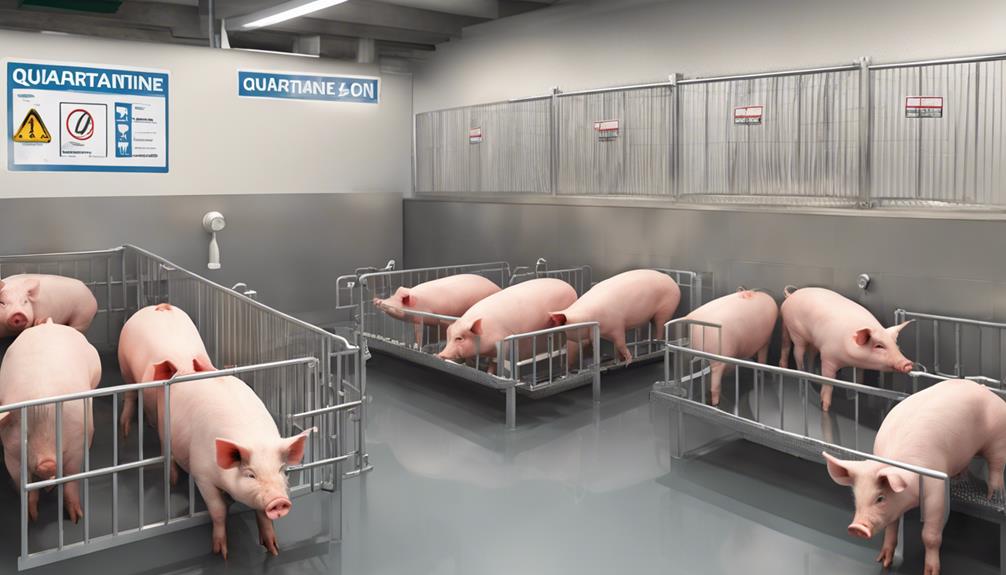Top 10 Practices for Optimal Pig Hygiene
Maintaining optimal pig hygiene may seem like a daunting task, especially when managing a large herd. However, by implementing specific practices, you can ensure the health and well-being of your pigs while also increasing productivity.
From regular cleaning routines to proper waste management and biosecurity measures, each step plays a crucial role in maintaining a hygienic environment for your pigs.
But what about the lesser-known practices that could make a significant difference?
Regular Cleaning of Housing
To maintain optimal pig hygiene, regularly clean the housing to prevent the buildup of dirt and bacteria. Establishing cleaning schedules is crucial for ensuring a clean environment for your pigs. Develop a routine that includes daily removal of waste and soiled bedding, as well as periodic deep cleaning and disinfection of the entire housing area. By adhering to a consistent cleaning schedule, you can significantly reduce the risk of infections and improve disease control among your pigs.
In addition to regular cleaning, thorough disinfection is essential for preventing the spread of bacteria and disease. Use appropriate disinfectants recommended for pig housing facilities, following the manufacturer's instructions for dilution and application. Pay special attention to high-risk areas such as feeding and watering stations, as well as areas prone to moisture buildup. Implementing a comprehensive disinfection routine will help safeguard the health and well-being of your pigs.
Proper Waste Management
Proper waste management plays a critical role in maintaining optimal pig hygiene by minimizing contamination risks and promoting a healthy environment for your pigs. To ensure effective waste management on your pig farm, consider the following key practices:
- Implement Proper Waste Disposal Methods: Utilize appropriate waste disposal techniques such as composting to efficiently manage pig waste and reduce environmental contamination.
- Regularly Monitor and Maintain Composting Systems: Keep a close eye on your composting process to ensure that it's functioning effectively and efficiently breaking down the waste materials.
- Control Odors: Implement strategies to control and minimize odors emanating from pig waste, which can improve the overall air quality and reduce stress on your pigs.
- Prevent Fly Infestations: Proper waste management plays a crucial role in preventing fly infestations, which can transmit diseases and cause discomfort to your pigs.
- Maintain Cleanliness in Waste Storage Areas: Regularly clean and sanitize waste storage areas to prevent the build-up of harmful bacteria and pathogens, promoting a healthier environment for your pigs.
Implementing Biosecurity Measures
Maintaining optimal pig hygiene also involves implementing biosecurity measures to prevent the introduction and spread of diseases among your pigs. Disease prevention and control are crucial aspects of pig farming to ensure the health and well-being of your livestock. By establishing stringent biosecurity protocols and measures, you can significantly reduce the risk of disease outbreaks within your pig population.
To enhance biosecurity on your farm, start by controlling access to your pig facilities. Limiting entry only to essential personnel and visitors helps minimize the potential introduction of pathogens. Additionally, implementing proper sanitation practices, such as disinfecting equipment and vehicles entering the premises, can further prevent disease transmission.
Regularly monitoring the health status of your pigs is essential to detect any signs of illness promptly. By conducting routine health checks and promptly isolating any sick animals, you can prevent the spread of diseases within the herd. Furthermore, working closely with a veterinarian to develop vaccination schedules tailored to your farm's specific needs can provide an added layer of protection against common pig diseases.
Monitoring Pig Health Daily
Enhance your pig farming practices by diligently monitoring the health of your pigs daily.
To ensure the well-being of your pigs and maintain a thriving farm, it's crucial to monitor their health daily. By conducting regular health checks and keeping detailed records, you can promptly address any issues that may arise.
Here are some essential practices to incorporate into your daily routine:
- Perform daily health checks on each pig to look for any signs of illness or distress.
- Keep thorough records of each pig's health status, including any treatments given or symptoms observed.
- Implement a robust parasite control program to prevent infestations and maintain the overall health of your pigs.
- Follow a strict vaccination schedule to protect your pigs from common diseases and ensure they remain healthy.
- Stay informed about any disease outbreaks in your area and adjust your monitoring and prevention strategies accordingly.
Providing Clean Water Sources
Ensure that your pigs have access to clean water sources to promote their health and well-being. Water quality plays a crucial role in the overall hygiene and health of your pigs. It's essential to provide fresh, clean water daily to prevent contamination and ensure optimal hydration. Poor water quality can lead to various health issues in pigs, affecting their growth and productivity. Regularly check the water sources to guarantee that they're free from debris, algae, or any other contaminants that could harm your pigs.
Disease prevention is another critical aspect of providing clean water sources for your pigs. Contaminated water can be a breeding ground for harmful bacteria and pathogens that may cause diseases. By maintaining high water quality standards, you reduce the risk of your pigs contracting illnesses, ultimately saving you time and money that would have been spent on treatments.
Regularly cleaning water troughs and pipes, along with monitoring the water sources for any signs of contamination, are essential practices in ensuring clean water for your pigs. Additionally, proper water management techniques, such as regular water testing and treatment if necessary, can further enhance the quality of the water your pigs consume. By prioritizing clean water sources, you're taking proactive steps towards maintaining optimal pig hygiene and health.
Maintaining Ventilation Systems
To optimize pig hygiene, consistently inspecting and servicing ventilation systems is crucial. Proper ventilation maintenance plays a vital role in ensuring good air quality within pig facilities. Here are five key practices to help you maintain optimal ventilation systems:
- Regular Cleaning: Clean ventilation systems regularly to remove dust, debris, and any blockages that could hinder proper airflow and decrease air quality.
- Inspect Fans and Filters: Check fans and filters frequently to ensure they're functioning correctly. Replace filters as needed to maintain good air quality.
- Monitor Airflow: Regularly monitor airflow patterns within the facility to ensure that all areas receive adequate ventilation and to identify any areas of poor air quality.
- Adjust Ventilation Systems: Make adjustments to the ventilation systems as needed based on the number of pigs in the facility, weather conditions, and any other factors that may affect air quality.
- Professional Maintenance: Schedule regular professional maintenance for ventilation systems to ensure they're operating efficiently and effectively in maintaining good air quality.
Quarantine New Animals

Maintaining optimal pig hygiene requires implementing a strict quarantine protocol for new animals entering the facility. Disease prevention is crucial in pig farming, and isolating new arrivals is a key step in ensuring the health of your existing herd. When introducing pigs from external sources, it's essential to isolate them from your main herd for a period of time to monitor their health and prevent the potential spread of diseases.
Isolating new pigs allows you to conduct a thorough health check. During this period, observe the new animals for any signs of illness such as coughing, sneezing, lethargy, or abnormal stool. It's also recommended to perform tests for common pig diseases to ensure the new arrivals aren't carriers of any harmful pathogens. This isolation period typically lasts for a minimum of 30 days but can vary depending on the specific diseases prevalent in your area.
Training Staff on Hygiene Practices
To enhance pig hygiene standards at your facility, training your staff on proper hygiene practices is essential. Staff education plays a crucial role in ensuring that hygiene protocols are followed diligently. Here are five key practices to consider when training your staff:
- Regular Training Sessions: Conduct regular training sessions to educate your staff on the importance of proper hygiene practices in pig management.
- Hands-On Demonstrations: Provide hands-on demonstrations to show the correct way to clean and sanitize pig pens, equipment, and feeding areas.
- Written Guidelines: Distribute written guidelines outlining hygiene protocols that staff can refer to easily.
- Supervision and Feedback: Supervise staff activities closely and provide constructive feedback to correct any hygiene practice deviations.
- Encourage Open Communication: Create an environment where staff feel comfortable reporting any hygiene concerns or suggesting improvements.
Frequently Asked Questions
What Are Some Common Signs of Stress in Pigs and How Can It Affect Their Overall Hygiene?
When pigs are stressed, they may show signs like restlessness, reduced appetite, or aggressive behavior. Stress can impact their hygiene by weakening their immune system, making them more susceptible to diseases. It's crucial to monitor these stress indicators to maintain optimal hygiene.
Detecting stress early on can help prevent hygiene issues and ensure the well-being of your pigs. Regular observation and prompt action are key to keeping their living environment clean and healthy.
Are There Any Specific Grooming Practices That Can Help Improve Pig Hygiene?
To improve pig hygiene, focus on grooming practices like regular baths and proper bathing techniques. Pig grooming involves keeping their skin clean and free from dirt and parasites. Bathing can help reduce odors and prevent skin issues. Use gentle shampoos and brushes designed for pigs.
Regular grooming not only enhances hygiene but also promotes a healthier coat and skin. Incorporate these practices to maintain your pig's cleanliness and well-being.
How Often Should Pig Bedding Be Changed to Maintain Optimal Hygiene Levels?
To maintain optimal hygiene levels, change pig bedding regularly. Frequency depends on cleanliness and pig behavior. Watch for signs of soiling or odor. Good bedding management is key.
Keep an eye out for wet spots and feces accumulation. Adjust changing schedule as needed. By staying proactive, you can ensure a clean and comfortable environment for your pigs.
Can Certain Feed Additives or Supplements Improve Pig Hygiene?
Feed additives and supplements can improve pig hygiene by supporting overall health and immune function. They help reduce stress signs, promote healthier skin and coat, and enhance grooming practices. Certain additives may also aid in parasite control.
While these are beneficial, remember to also prioritize proper bedding changing frequency, natural remedies, and good hygiene practices to ensure optimal pig health and cleanliness.
Are There Any Natural Remedies or Alternative Methods for Controlling Parasites in Pigs Without Using Chemicals?
To control parasites in pigs without chemicals, you can explore natural remedies and alternative methods. Consider using diatomaceous earth in feed to combat internal parasites. Another option is planting beneficial plants like chicory to deter external parasites. Regularly cleaning and rotating pastures can also help reduce parasite load. By incorporating these chemical-free solutions into your pig management practices, you can promote a healthier environment for your animals.
Conclusion
In conclusion, following these top 10 practices for optimal pig hygiene is essential for maintaining a healthy and productive pig herd.
By regularly cleaning housing, properly managing waste, implementing biosecurity measures, monitoring pig health daily, providing clean water sources, maintaining ventilation systems, quarantining new animals, and training staff on hygiene practices, you can ensure the well-being of your pigs and prevent the spread of diseases.
Remember, a clean environment leads to happy and healthy pigs!
